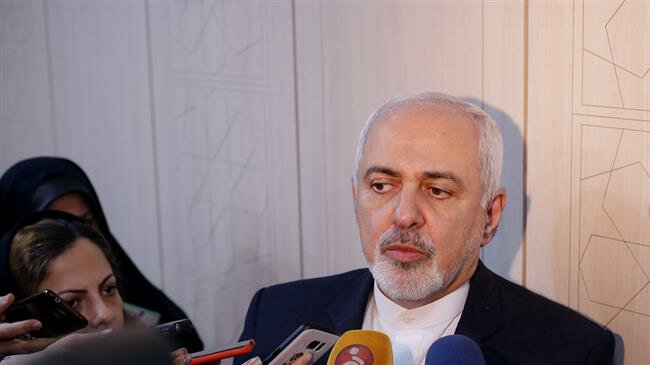Zarif says Europe must take practical steps to guarantee Iran’s oil revenues
Iranian Foreign Minister Mohammad Javad Zarif has hailed France’s diplomatic efforts to save the 2015 multilateral nuclear deal, stressing, however, that Tehran is expecting practical steps by the Europeans aimed at guaranteeing Iran’s oil revenues.

Zarif made the comment to reporters after his press briefing in the Bangladesh capital Dhaka on Wednesday, when asked about recent remarks made by French Finance Minister Bruno Le Maire regarding his talks in the US.
“Surely his remarks are positive, but what is determining for us are the developments on the ground that is the measures that the Europeans need to take in paying or purchasing Iran’s oil,” Zarif said.
Le Maire met with US authorities in Washington on Tuesday as part of a plan to offer Iran a $15 billion economic lifeline and rescue the Iran nuclear accord, officially known as the Joint Comprehensive Plan of Action (JCPOA).
The French minister met his US counterpart, Steven Mnuchin, and tweeted afterwards that he had “constructive” talks about a French digital tax on American tech companies, without mentioning Iran.
He was also due to later meet with US President Donald Trump’s economic adviser Lawrence Kudlow, and chief US trade negotiator Robert Lighthizer.
According to a French official, Le Maire discussed waivers for companies that would allow Iran to sell oil. China, India and Japan would be the expected clients.
Iran, led by Deputy Foreign Minister Abbas Araqchi, has also held extensive talks with French officials on ways to salvage the nuclear deal.
Araqchi said earlier on Wednesday that the focus of talks with the French side — to hammer out details of credit lines that would give Iran some respite from sanctions — was on oil sale and ways to facilitate Iran’s free access to its revenues.
Commenting on the European diplomatic process led by France aimed at saving the Iran deal, President Hassan Rouhani also told a cabinet meeting earlier in the day that “a significant part of differences” between Tehran and Europe has been resolved, but the two sides “have yet to reach a final agreement.”
Rouhani said that the European parties to the 2015 Iran deal — France, Britain and Germany — will have two more months to fulfill their contractual obligation to protect Iran against the American sanctions, which returned in place after Washington abandoned the agreement last May.
In reaction to US coercive measures, Iran has rowed back on its nuclear commitments twice in compliance with articles 26 and 36 of the JCPOA. Rouhani warned during his Tuesday remarks that the European states have until Thursday to convince Iran not to slash further nuclear commitments.
Zarif told reporters on Wednesday that Iran will continue talks to save the nuclear deal, but will take necessary measures if the Europeans fail to fulfill their own obligations.
“We announced from the very beginning that we are ready for talks but we also take our own steps. If negotiations bear fruit, these steps can be suspended or even reversed, but should the negotiations be of no avail and the Europeans fail to live up to their commitments at least with respect to oil sales and return of Iran’s oil sale in different forms, Iran will continue its measures,” he warned.
The top Iranian diplomat said that Iran would also take the fourth step in scaling back its commitments under the JCPOA within the next two months if further negotiations end in vain.
Iran has not left the negotiating table and will not so do, Zarif said, but stressed that holding talks do not mean that Iran is budging away from its principles and accepting conditions set by the opposite side, he added.
Araqchi also said that Tehran would return into full compliance with the JCPOA only if it received $15 billion in France-proposed credit lines for oil sales over four months otherwise the Islamic Republic would continue cutting its deal commitments.
France has been making efforts to convince the US to agree on the credit line that guarantees Iran’s oil exports.
No trade mechanism until Iran passes terrorism financing laws: French diplomat
Meanwhile, a French diplomatic source said that European trade mechanism to barter humanitarian and food goods with Iran will not work until Tehran sets up a mirror company and passes laws against money-laundering and terrorism financing.
“The Iranian mirror structure is not operational. The day they have signed the necessary FATF (Financial Action Task Force) conditions, we’ll talk about it and the day that we are sure that the first transactions through INSTEX aren’t put under American sanctions, (then) we’ll talk about it again,” the diplomatic source said.
European officials say although it would facilitate its establishment, conforming to Paris-based FATF rules is not a prerequisite for INSTEX, an apparatus expected to circumvent the US sanctions.

Iran oversight body rejects controversial bill over ‘flaws’Iran’s Guardian Council has dismissed a controversial bill on combating terror financing which the parliament had adopted last month.
Iran has already been implementing a domestic anti-money laundering law as part of its efforts toward financial transparency.
Iran’s Guardian Council,which vets parliament’s bills for compliance with the Constitution,has dismissed a controversial bill that the parliament had adopted in order to maintain relations with European allies amid US sanctions.







